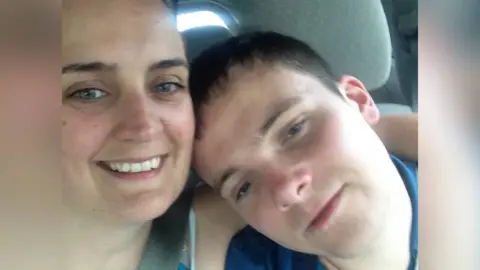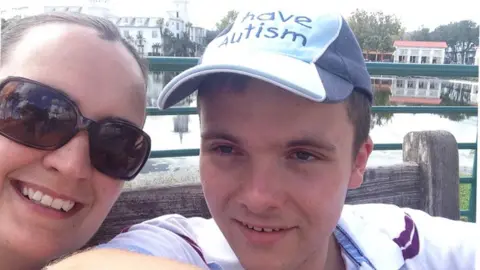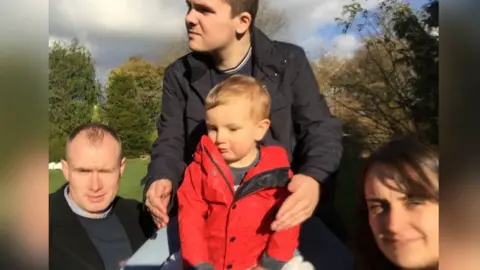Autism: How my autistic foster brother inspired my life's work
 Risca Solomon
Risca SolomonA woman who passed up going to university to care for her autistic foster brother has described how he inspired her to set up her own behavioural therapy centre.
Risca Solomon, from Haverfordwest, Pembrokeshire, first met Dan when he was four years old.
His previous respite placements had broken down due to his challenging behaviour.
But Ms Solomon, whose parents were foster carers, wanted to help.
"When I first met Dan I was 18 and on work experience at a special school, and he touched my heart," Ms Solomon said.
"I begged my parents, who'd been foster and respite carers since I was 11, to step in."
Her parents were reluctant at first due to the level of care Dan would need, something they felt was beyond their level of experience and expertise.
But they agreed after Ms Solomon promised to be one of his primary care givers.
"It changed my life," Ms Solomon said.
"Instead of going away to study, I enrolled on an Open University course so I could still be around to help out with Dan.
"I started to look into behaviour analysis, and once I saw the beneficial effects it was having on him I knew I had to spread the word."
Behaviour analysis focuses on understanding why people behave the way they do and how behaviours can be changed.
Ms Solomon said when Dan first came to live with them, his behaviour could be challenging.
"It was hard not to take it personally; we were providing all this love and care, but it was difficult for us," she said.
"But as time went on we learned his trigger actions and showed him there was a simpler way to get what he needed."
 Risca Solomon
Risca SolomonPart of the therapy involves de-sensitising the trigger points which can provoke challenging behaviour.
Autistic young people can be hyper-sensitive to noise and light, but by making environments calmer symptoms can be reduced.
Within a month of living with Ms Solomon and her parents, Dan was able to use sign language to communicate.
Ms Solomon then helped Dan to learn how to talk.
"We knew he wanted to talk, he was making some noises, and trying to mimic what we were doing," Ms Solomon explained.
"The more I got to know him, the more I realised that it wasn't a developmental issue, he simply didn't know how to manipulate his mouth into the shapes required for speech."
After studying a masters degree in challenging behaviour at Cardiff University, Ms Solomon tried using Applied Behaviour Analysis (ABA) to teach Dan to speak.
After finding the right combination of techniques, Dan began to develop speech.
Documenting Dan's progress on YouTube, Ms Solomon started getting requests from other families for support.
At the time, she was preparing to sit a behaviour analyst exam and was then able to create her own therapy company, Skybound.
Alongside 38 staff members, Ms Solomon now delivers therapy and care to those who need it.
"We use a system called talk tools, a series of plastic mouthpieces which help to shape the lips and tongue into the position to make the sounds needed for speech", she said.
ABA is considered by some people to be a controversial method of treatment, which the National Autism Society has described as polarising.
But Ms Solomon said it is all about how it is taught.
"I wouldn't ask any of our clients to do anything I wouldn't do myself. I put the pieces into my mouth and show them the shapes they're creating.
"We then look for signs of consent for us to help them with the tools.
"It's purely based on consent, and for many it's their favourite part of the therapy; they try to hurry us along to the point at which we get the talk tools out."
The National Autism Society's website acknowledges that some believe ABA has developed considerably and that it can help people to develop vital life skills and stay safe.
But it points out that some remain fundamentally opposed to ABA.
 Risca Solomon
Risca SolomonMs Solomon said for the people she works with, "what is a good outcome entirely depends on where we're starting from.
"On one end of the scale is a young girl who can use a switch with her head to attract attention, because she loves music, and when she hit the switch she heard a pop song.
"On the other are lads who are very chatty but whose diets are so severely limited that they were in danger of needing to become tube-fed.
"We were able to desensitise their food phobia to the extent that they were making their own sandwiches and eating all sorts of things they'd never even tried before."
Skybound is now attempting to open a new residential centre to educate clients alongside their families.
Meanwhile Dan lives two days a week with Risca, her husband and their two young children, and spends the rest of the week with Risca's parents.
